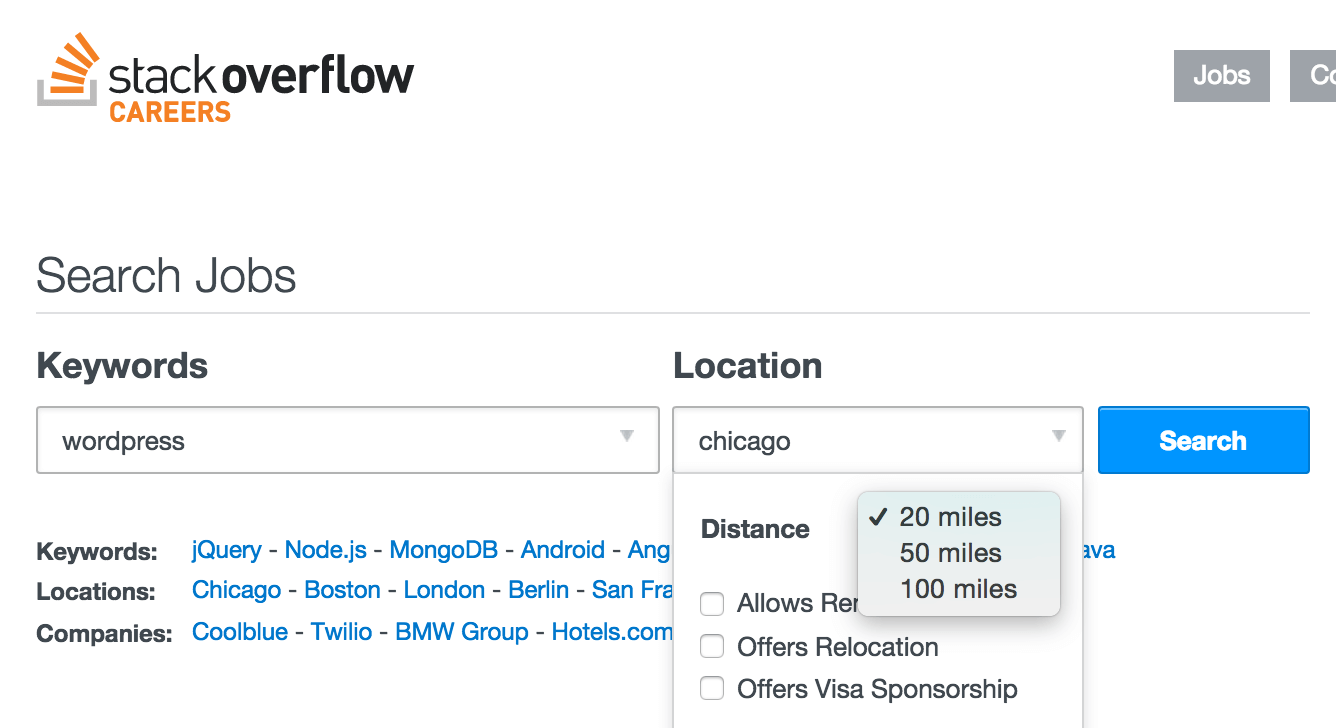So you’ve decided to set up shop as a WordPress developer. You’ve got a lot of personal projects under your belt and have set up several websites for friends and family. How hard can taking things to the next level be?
Let’s not mince words – it can be quite rough out there for a freelance developer. There’s an enormous amount of competition and a seemingly endless supply of service providers willing to work for a tenth of what they should be charging.
That doesn’t mean it’s an impossible market to break into, however; it just means you’re going to have to roll up your sleeves and apply some good old-fashioned elbow grease to get things moving.
We’ve put together eight top tips to point you in the right direction. Let’s dive in!
- 1 1. Make Yourself Stand out
- 2 2. Negotiate and Don’t Undersell Your Services
- 3 3. Don’t Be Afraid to Look Offline
- 4 4. Explore Lesser-Known Online Marketplaces
- 5 5. Polish Your Online Presence and Portfolio
- 6 6. Get Out There and Network
- 7 7. Tailor Your Approach
- 8 8. Pitch Solutions, Not Technology
- 9 Summary
1. Make Yourself Stand out
It stands to reason that the easiest way to get hired is to strongly differentiate yourself from other applicants. To do this, you need to understand what your strengths are and use them as selling points for potential employers. This can be as simple as having an outstanding portfolio or crafting a personalized pitch.
In other words, what can you offer that other WordPress developers can’t?
Some developers take things further by focusing on niches. Are you a cooking enthusiast? You can use this experience to make your food-related web projects really stand out and connect with local businesses in that area. Customers always appreciate dealing with someone who shares their passion and understands their business.
Another way to stand out is to emphasize which programming languages you’re fluent in and showcase personal projects that reflect your expertise in your public portfolio. Just because you’re looking for work as a WordPress developer doesn’t mean you should let your other skills rust away. JavaScript, for example, is likely to be heavily in demand for the foreseeable future.
2. Negotiate and Don’t Undersell Your Services
One of the biggest mistakes you can make when starting your career as a web developer is to hobble yourself with cheap rates just to land those first few crucial clients.
Don’t believe me? If you’ve spent any time in the web development community you’ve likely seen veterans chastising newbies for this repeatedly; it’s basically gospel at this point.
Lowball pricing attracts problematic clients like bees to honey. Good clients – the kind who understand the value of your work and time – will be ready to pay you a decent living wage. You might have to look hard for that first big break, but it’s out there.
If you do allow yourself to be bullied into underselling your services, you risk falling into an endless loop of cheap clients and stressful projects where you work for the equivalent of minimum wage. Make the smart choice and avoid this from the outset.
3. Don’t Be Afraid to Look Offline
As a web developer, your first instinct will naturally be to look for that first gig online. But, since you’re probably not going to have an extensive portfolio or many professional references yet, your best bet might be to try to close the deal in person with those first few clients.
Many businesses have been burned online in the past by less than scrupulous or incompetent freelancers and welcome the opportunity to deal with a developer in the flesh. Being just a phone call or drive away might be enough to actually seal the deal in such cases.
If using this approach, steel yourself for rejection. You’ll likely have to contact a lot of businesses before finding someone who’s interested in hiring you.
Every developer has their own tactics here. Some limit themselves to scouting for local businesses, others target outdated pages or focus only on high-income clients. Find out what works best for you and start making calls and sending emails once you’ve tailored a pitch for each potential customer.
4. Explore Lesser-Known Online Marketplaces
Everyone knows about Upwork and Fiverr, but what about Reddit’s hiring listings, the official WordPress job listings or Codeable.io? These are just a few of the many less densely populated alternatives out there.
That’s not to say there isn’t plenty of competition on these platforms as well, but it pays to cast your net as widely as possible while still maintaining an up-to-date profile on each of these sites.
5. Polish Your Online Presence and Portfolio
If you want clients to find you, you need to make it easy for them. I’m not talking about spamming advertisements for your services across all social media outlets you happen to be a member of here. At the very least, you need to review your job-seeking profiles, ensure that your “current job” statuses are up to date and include links to your portfolio wherever pertinent.
Start by making sure you have an up-to-date LinkedIn profile. The platform attracts a lot of flak, but it’s still the network of choice for a huge amount of potential clients. A polished presence there is a great calling card and might even get you new business all by itself.
A word of warning about social media sites. The first step many clients will take is doing a little background digging on public-facing profiles to get a feel for what type of person they’re dealing with, so make sure you’re presenting an appropriate image online.
As for your portfolio, it’s pretty common for people trying to get into web development to make excuses as to why they haven’t set theirs up yet. Don’t let yourself fall prey to cobbler’s children syndrome. Put yourself in the customer’s shoes; would you hire someone with no previous work experience who doesn’t even have a couple of personal projects to show off?
Not having any completed client work shouldn’t stop you from putting together a portfolio either. Share your most polished pet projects, online repositories, or open-source project contributions – whatever it takes to show clients you’re the real deal.
6. Get Out There and Network
There are thousands of online communities for every kind of freelancer – from designers to WordPress developers – to share their work experiences. These can prove an invaluable resource when you’re just starting out for all kinds of advice.
Some examples of these include the web development and freelancer sections on Reddit and Stack Overflow Careers.
It’s pretty much guaranteed that no matter what doubts or problems you might be experiencing, somebody somewhere online has already gone through the same thing. In many cases, they’ve taken the trouble to write about their experiences and compiled handy lists of solutions that can help you out.
Your networking endeavors shouldn’t be limited to the virtual world, though. Meeting people face-to-face and handing them your newly printed business cards (you have some of these ready, right?) can sometimes make a more lasting impression than email.
There are all sorts of real-world networking opportunities available if you take the time to research options in your area. These could be local WordPress meetups, hackathons or conferences. Keep your ear to the ground and start getting social!
7. Tailor Your Approach
No two customers are the same. If a potential client approaches you with some basic information about a project, make sure to do your due diligence and research his business and market sector as much as possible.
This should help you make informed suggestions about good practices relating to the project in question. For example, if building a portfolio site for a photographer, you’d naturally suggest putting the work front and center. If you’re dealing with a store, the nitty-gritty of e-commerce customer flow is where you’ll be spending most of your time digging into details.
These examples may sound obvious, but you’d be amazed at how many developers simply offer cookie-cutter solutions to clients without taking the time to explore their exact needs.
8. Pitch Solutions, Not Technology
Gone are the days where a business could afford not to have a web presence. What this means for you as a developer is that in most cases you won’t have to sell customers on the actual idea of having a site; they’re more interested in results.
This means you need to sharpen up your sales skills in many cases. Remember, you’re not selling a simple website or a particular technology, you’re selling a solution.
Maybe your client’s business is leaving money on the table by not being able to process online orders. Maybe they’re crippling their sales pipeline by not letting customers make appointments online, or sign up for a mailing list in order to receive future offers. Find the problem and pitch the solution.
Part of your job as a developer is to sit down with your client, analyze their requirements and come up with ideas that they may not yet have considered. Don’t worry about these ideas getting occasionally shot down. You’re building the ability to identify and solve problems in the wild, a skill that will pay off hugely down the line.
Summary
Competition for WordPress developers is intense and the sheer number of people looking for work online can be daunting. There’s always room for new talent, however.
Let’s recap the tips we covered for landing those crucial first clients:
- Make yourself stand out.
- Negotiate and don’t undersell your services.
- Don’t be afraid to look offline.
- Explore lesser-known online marketplaces.
- Polish your online presence and your portfolio.
- Get out there and network.
- Tailor your approach.
- Pitch results, not tech.
If you take your job seriously and go the extra mile for your clients, you’ll be drowning in referrals in no time. It won’t all be smooth sailing but once you’ve got those first few jobs under your belt, you’ll soon start developing momentum.
How did you land your first job as a WordPress developer? Are you thinking about trying your luck out as a freelancer? Let us know in the comments!
Article thumbnail image by blocberry / shutterstock.com. LinkedIn image courtesy of Frank Chimero.











Good advice. Also keep in mind that many employers will test your skills. Automated tests are popular and easy to use, so a link to a test from TestDome or another coding test site might be coming your way.
https://www.testdome.com/
Be wary.
Yes i agree with you , i am still in the process of getting a new clients and i tried to undersell my service and still doesn’t work for me, so I found that i have to show off my strength to the clients, every one ask for my previous work history , so I decided not to hobble my self any more as a first step , then i offered my first two websites as a free for the first two clients.
Fortunately i have got my first two and i am working on these two projects.
I missed up putting any useful information about me on the social network which i see very important.
Thanks for your great topic
Regards
I can’t agree with point 2 enough!!! I made the mistake of low-balling in the early days of my business and ended up with customers some of whom I’m still hoping will move on to use another data recovery service.
Fortunately once business picked up, I quickly adjusted my pricing and have landed far better clients ever since.
Point 6 about networking is great too. After I realized how many people in my industry (data recovery) I knew, I actually launched my own forum on the site and have about 150 active members now generating content every day for me. It’s surprising how often you’ll get customers from online referrals by people you only dealt with once or twice to answer a quick forum question.